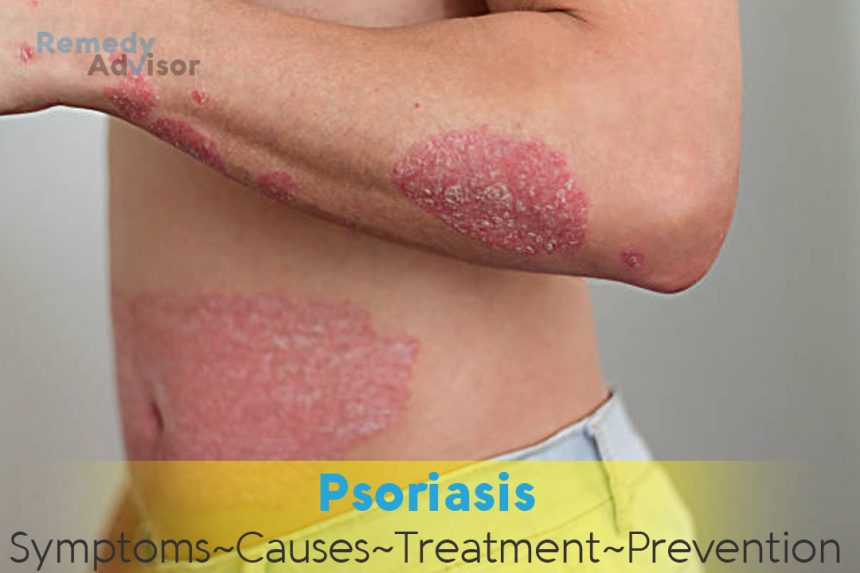What is it
Psoriasis is a non-contagious but tenacious skin disorder which takes place when the normal cycle of skin cell growth and replacement is disturbed. Usually, new skin cells raise from the inmost level of skin to the upper layer the epidermis and change dead skin cells, that are shed. This procedure normally takes around 28 days. In areas marked by psoriasis, the process has been hastened; taking place in only three or four days and as a result extra cells gather, affecting the characteristic scaly patches.
Outbreaks of psoriasis tend to first appear between the ages of 10 and 30 and may continue the rest of a person’s life. The rashes can decrease and increase in harshness, often for no seeming reason, though they are often more severe throughout the winter (perhaps because of drier air) and extended periods indoors. Psoriasis cannot be treated, and it can be aching and unfriendly to live with, particularly in severe cases when skin can crack and blister and nails may become pitted and misshapen.
Symptoms
- Distinct rash like patches of dry, reddened, raised and inflamed skin with white peeling scales (commonly appearing on the scalp, elbows, knees, knuckles or lower back).
- Itching.
- In severe circumstances cracked and erupted skin, usually aching, and ultimately disfiguring.
- In certain severe circumstances pitted, powdery, and loosened finger nails.
What causes it
No one knows what causes psoriasis. Strong evidence points to a genetic component. There are several things that can trigger psoriasis or make symptoms worse. These include alcohol, obesity, stress, sore throat from an infection, anxiety, certain medications, and sunburn. Contrary to popular belief, there is no link between diet and psoriasis.
What if you do nothing
There is no cure for psoriasis. Since this long-lasting ailment is usually painful and unfriendly to live with, certain cure is suggested to relieve the signs.
Home remedies
Psoriasis is not curable, but it can be controlled. Only trial and error will determine which treatments are most effective for you. Improvement can take a few weeks or as long as several months.
Get some sun
Most people should guard against too much exposure to the sun. But to minimize the effects of psoriasis, regular sun- bathing offers some benefit. Proceed cautiously, staying in direct sunlight for 15 to 30 minutes a day, being careful to avoid sunburn. About 80 percent of people with psoriasis will see improvement in three to six weeks. A half hour before sunbathing, apply sunscreen with a sun protection factor (SPF) of 15 to areas of healthy skin. This will protect against sunburn, which will aggravate the psoriasis or make it resistant to future sunlight treatment.
Moisturize
Apply moisturizing skin creams liberally to your skin to keep it moist and less likely to crack. Avoid alcohol-based preparations, which can dry the skin; also avoid lanolin-based products if you are allergic to lanolin. When used regularly, petroleum jelly and lactic-acid-based moisturizers can keep the skin from drying.
Take a soak
Special bath solutions containing either-oatmeal, various oils, or coal tar may offer symptomatic relief for psoriasis. Soak for 15 minutes in warm bath water to soothe the skin and encourage healing. Moisturize when you get out.
Remove skin scales
Nonprescription creams and ointments that contain salicylic acid help to soften and remove scales. Coal-tar gels, also available in the pharmacy without prescription, can slow down the rate that the skin cells are produced, thereby improving psoriasis.
Get some scalp relief
For psoriasis plaques in the scalp, a distinct softening gel which consists of salicylic acid is accessible over the counter. Apply it to the scalp at night according to directions, and wash it out in the morning with a medicated dandruff shampoo.
Be careful with your hair
When combing your hair, don’t comb too vigorously. Anytime you scratch your scalp with a comb or brush, you raise the danger of having psoriasis come back worse compared to before.
Avoid scratching
If you have an itch and feel like irritating, use moisturizer instead.
Reduce stress in your life
If stress makes your psoriasis worse, take steps to reduce it. Stress reduction exercises like meditation, biofeedback, and yoga might work well for you.
Prevention
There is no way to prevent psoriasis. However, avoiding alcoholic beverages and minimizing your exposure to cold temperatures, preventing skin injuries, and reducing stress may prevent any psoriasis flare-ups.







